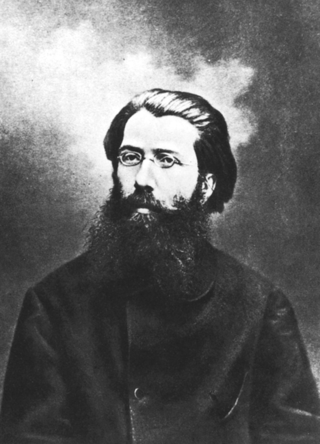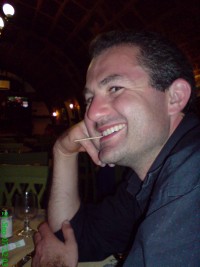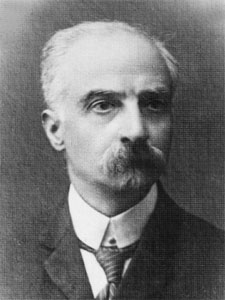Anarchism is a political philosophy and movement that is skeptical of all justifications for authority and seeks to abolish the institutions it claims maintain unnecessary coercion and hierarchy, typically including nation-states, and capitalism. Anarchism advocates for the replacement of the state with stateless societies and voluntary free associations. As a historically left-wing movement, this reading of anarchism is placed on the farthest left of the political spectrum, usually described as the libertarian wing of the socialist movement.
Individualist anarchism is the branch of anarchism that emphasizes the individual and their will over external determinants such as groups, society, traditions, and ideological systems. Although usually contrasted with social anarchism, both individualist and social anarchism have influenced each other. Mutualism, an economic theory sometimes considered a synthesis of communism and property, has been considered individualist anarchism and other times part of social anarchism. Many anarcho-communists regard themselves as radical individualists, seeing anarcho-communism as the best social system for the realization of individual freedom. Some anarcho-capitalists claim anarcho-capitalism is part of the individualist anarchist tradition, while others disagree and claim individualist anarchism is only part of the socialist movement and part of the libertarian socialist tradition. Economically, while European individualist anarchists are pluralists who advocate anarchism without adjectives and synthesis anarchism, ranging from anarcho-communist to mutualist economic types, most American individualist anarchists of the 19th century advocated mutualism, a libertarian socialist form of market socialism, or a free-market socialist form of classical economics. Individualist anarchists are opposed to property that violates the entitlement theory of justice, that is, gives privilege due to unjust acquisition or exchange, and thus is exploitative, seeking to "destroy the tyranny of capital, — that is, of property" by mutual credit.
Anarchist communism is a political philosophy and anarchist school of thought that advocates communism. It calls for the abolition of private property but retention of personal property and collectively-owned items, goods, and services. It supports social ownership of property and the distribution of resources "From each according to his ability, to each according to his needs".

Errico Malatesta was an Italian anarchist propagandist and revolutionary socialist. He edited several radical newspapers and spent much of his life exiled and imprisoned, having been jailed and expelled from Italy, Britain, France, and Switzerland. Originally a supporter of insurrectionary propaganda by deed, Malatesta later advocated for syndicalism. His exiles included five years in Europe and 12 years in Argentina. Malatesta participated in actions including an 1895 Spanish revolt and a Belgian general strike. He toured the United States, giving lectures and founding the influential anarchist journal La Questione Sociale. After World War I, he returned to Italy where his Umanità Nova had some popularity before its closure under the rise of Mussolini.
Anarcho-primitivism, also known as anti-civilization anarchism, is an anarchist critique of civilization that advocates a return to non-civilized ways of life through deindustrialization, abolition of the division of labor or specialization, abandonment of large-scale organization and all technology other than prehistoric technology and the dissolution of agriculture. Anarcho-primitivists critique the origins and alleged progress of the Industrial Revolution and industrial society. According to anarcho-primitivists, the shift from hunter-gatherer to agricultural subsistence during the Neolithic Revolution gave rise to coercion, social alienation, and social stratification.
Green anarchism, also known as ecological anarchism or eco-anarchism, is an anarchist school of thought that focuses on ecology and environmental issues. It is an anti-capitalist and anti-authoritarian form of radical environmentalism, which emphasises social organization, freedom and self-fulfillment.
Anarchists have employed certain symbols for their cause, including most prominently the circle-A and the black flag. Anarchist cultural symbols have been prevalent in popular culture since around the turn of the 21st century, concurrent with the anti-globalization movement. The punk subculture has also had a close association with anarchist symbolism.
The history of anarchism is ambiguous, primarily due to the ambiguity of anarchism itself. Scholars find it hard to define or agree on what anarchism means, which makes outlining its history difficult. There is a range of views on anarchism and its history. Some feel anarchism is a distinct, well-defined 19th and 20th century movement while others identify anarchist traits long before first civilisations existed.

Carlo Cafiero was an Italian anarchist that led the Italian section of the International Workingmen's Association (IWA). An early leader of the Marxist and anarchist communist movements in Italy, he was a key influence in the development of both currents.
Anarchism without adjectives is a pluralist tendency of anarchism that opposes sectarianism and advocates for cooperation between different anarchist schools of thought. First formulated by the Spanish anarchists Ricardo Mella and Fernando Tarrida del Mármol, as a way to bridge the ideological divide between the collectivists and communist factions, it was later adopted by the Italian anarchist Errico Malatesta and the American individualist Voltairine de Cleyre.

Saul Newman is a British political theorist who writes on post-anarchism. He is professor of political theory at Goldsmiths College, University of London.

Francesco Saverio Merlino was an Italian lawyer, anarchist activist and theorist of libertarian socialism.
Anarchy is a form of society without rulers. It is primarily advocated by anarchists who propose replacing the state with a stateless society based on voluntary free association. These institutions or free associations are generally modeled to represent concepts such as community and economic self-reliance, interdependence, or individualism. In simple terms anarchy means 'without rulers' or 'without authority'. As such, under anarchy there is no coercive rule by a single group or individual, rather instead by an individual upon themselves or by the people entirely.
Anarchism in Egypt refers both to the historical Egyptian anarchist movement which emerged in the 1860s and lasted until the 1940s, and to the anarchist movement as it has re-emerged in the early 2000s. Anarchism was first introduced to Egypt by Italian immigrant workers and political exiles in the 1860s. The Italian community in Egypt was one of numerous such communities of expatriate workers whose presence in Egypt dated to the modernisation programme of Muhammad Ali, Wāli of Egypt from 1805 to 1849, as part of which the immigration of foreigners with useful skills was encouraged. This process was accelerated under Ali's successors, in particular with the construction of the Suez Canal in the 1850s.
Social anarchism, also known as left-wing anarchism or socialist anarchism, is the branch of anarchism that sees liberty and social equality as interrelated.
A general strike is a strike action in which participants cease all economic activity, such as working, to strengthen the bargaining position of a trade union or achieve a common social or political goal. They are organised by large coalitions of political, social, and labour organizations and may also include rallies, marches, boycotts, civil disobedience, non-payment of taxes, and other forms of direct or indirect action. Additionally, general strikes might exclude care workers, such as teachers, doctors, and nurses.
Insurrectionary anarchism is a revolutionary theory and tendency within the anarchist movement that emphasizes insurrection as a revolutionary practice. It is critical of formal organizations such as labor unions and federations that are based on a political program and periodic congresses. Instead, insurrectionary anarchists advocate informal organization and small affinity group based organization. Insurrectionary anarchists put value in attack, permanent class conflict and a refusal to negotiate or compromise with class enemies.
Collectivist anarchism, also called anarchist collectivism and anarcho-collectivism, is an anarchist school of thought that advocates the abolition of both the state and private ownership of the means of production. In their place, it envisions both the collective ownership of the means of production and the entitlement of workers to the fruits of their own labour, which would be ensured by a societal pact between individuals and collectives. Collectivists considered trade unions to be the means through which to bring about collectivism through a social revolution, where they would form the nucleus for a post-capitalist society.
Anarchism and libertarianism, as broad political ideologies with manifold historical and contemporary meanings, have contested definitions. Their adherents have a pluralistic and overlapping tradition that makes precise definition of the political ideology difficult or impossible, compounded by a lack of common features, differing priorities of subgroups, lack of academic acceptance, and contentious historical usage.
François Dumartheray (1842-1931) was a French anarcho-communist activist. He was a member of the International Workingmen's Association and the Jura Federation, and collaborated with Peter Kropotkin in the journal Le Révolté.



